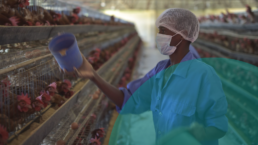Largely employed by meatpacking plants and farms, immigrant workers contend with hazardous conditions along with discrimination, low pay, and language barriers.
By Cirien Saadeh, Prism
Since the onset of the COVID-19 pandemic, Minnesota meatpacking plants have been epicenters of both the virus itself, and of workers organizing in response to demand safer and more equitable working conditions. Now, as much of the United States. seems to be moving on the from the pandemic despite surging case and death numbers in many communities, COVID-19 worries remain top of mind for Minnesota rural meatpacking workers, many of whom come from the state’s growing immigrant communities and must contend with low pay and hazardous work—often while navigating language barriers and discrimination.
Last year, Somali immigrant workers at the Pilgrim’s Pride poultry processing plant in Cold Spring, Minnesota, staged a massive walkout to protest working conditions during the earliest months of the COVID-19 pandemic. Among those workers was Bashiir, whose name has been changed because he fears workplace reprisals for talking to the media. He immigrated to the United States from Somalia in the late 1990s, and has worked in meatpacking for more than a decade.

“I moved to the United States and then to Saint Cloud for this job,” he said. Bashiir enjoys living in St. Cloud, and he has seen the community of immigrants from his home country grow throughout his time there, with many of them—including his family members—also finding themselves working in the meatpacking industry. The work has never been without its challenges, but the pandemic ratcheted up the risks significantly.
Recent Posts
“Arrest Now, Ask Questions Later”: Why Did L.A. ICE Agents Arrest and Jail U.S. Citizen Andrea Velez?
July 3, 2025
Take Action Now “They didn’t have vests that said ICE or anything. Their cars didn’t have license plates. … Just because of the color of our…
Trump’s Big, Beautiful Bill Is Naked Class War
July 3, 2025
Take Action Now Trump’s “Big, Beautiful Bill” trades tax cuts on millionaires for the dissolution of society.By Hamilton Nolan, In These Times…
Mayor Mamdani’s First Day, A Zero Hour Conversation With Richard Wolff
July 2, 2025
Take Action Now If elected, what would Mayor Mamdani do on his first day in City Hall? How would a democratic socialist govern as a big-city mayor?……
The U.S. Is Funding A Bloodbath At Gaza Aid Centers
July 2, 2025
Take Action Now The admin just gave $30M to GHF, the organization at the center of charges that Israel is weaponizing assistance and shooting at…




